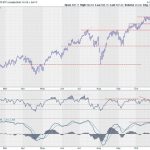Stock Market Hits Record Levels: Prepare for What Inflation Can Bring Next
The recent surge in stock market levels has left investors both excited and cautious. With various factors at play, including the ongoing pandemic recovery, government stimulus packages, and signs of rising inflation, many are left wondering what the future holds for their investments. Inflation, in particular, has become a major concern as it can have a significant impact on stock market performance. Understanding the implications of inflation and how to prepare for its effects can help investors navigate uncertain times and make informed decisions.
Definition and Causes of Inflation
Inflation refers to the general increase in prices of goods and services over time, leading to a decrease in the purchasing power of a currency. Inflation can occur due to various factors, such as an increase in demand, rising production costs, changes in government policies, or fluctuations in currency value. When inflation is high, it erodes the value of money, making it more costly to purchase goods and services.
Effects of Inflation on Stock Market
Inflation can have mixed effects on the stock market, depending on the magnitude and pace of price increases. In general, moderate inflation can be beneficial for stocks as it reflects a growing economy and increased corporate profits. However, high inflation rates can lead to uncertainty, reduced consumer spending, and higher interest rates, which can negatively impact stock market performance. Companies may face challenges in maintaining profit margins, leading to lower stock prices and investor confidence.
Preparing for Inflation in the Stock Market
Given the potential impact of inflation on the stock market, investors need to be proactive in preparing for possible scenarios. Here are some strategies to consider:
1. Diversification: Diversifying your investment portfolio can help mitigate risks associated with inflation. By spreading your investments across different asset classes, sectors, and regions, you can protect your portfolio from the impact of inflation on specific industries or sectors.
2. Invest in Inflation-Resistant Assets: Certain assets, such as real estate, commodities, precious metals, and Treasury Inflation-Protected Securities (TIPS), are considered inflation-resistant. Investing in these assets can help safeguard your portfolio against the effects of rising prices.
3. Monitor Economic Indicators: Keeping an eye on key economic indicators, such as inflation rates, interest rates, and GDP growth, can help you anticipate market trends and adjust your investment strategy accordingly.
4. Focus on Quality Companies: During periods of high inflation, it is essential to focus on investing in high-quality companies with strong fundamentals and competitive advantages. These companies are better positioned to weather economic downturns and maintain their value.
5. Consider Hedge Strategies: Utilizing hedge strategies, such as options, futures, or inverse ETFs, can help protect your portfolio from sudden market fluctuations caused by inflation.
Conclusion
As the stock market reaches record levels and inflation concerns loom large, investors must be prepared to navigate the uncertainties ahead. By understanding the impact of inflation on stock market performance and implementing strategies to mitigate risks, investors can position themselves to weather market volatility and preserve their wealth. Staying informed, diversifying portfolios, and focusing on quality investments are key steps in preparing for what inflation can bring next.



